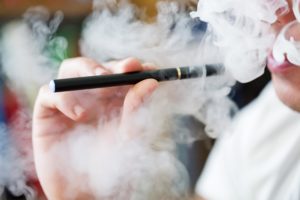 Tribune News Service
Tribune News ServiceWith the rise in deaths and illnesses connected to e-cigarette usage this year, President Donald Trump proposed a federal ban on most, if not all, flavored e-liquids for e-cigarettes Sept. 11. Vape sellers in Waynesburg, however, think banning is not a good decision based on their knowledge of e-cigarettes, human nature and history.
In regards to the diseases and deaths, Josh Whoolery, owner of The Vaporium, said the problem is that people are inhaling harmful juices not created by companies. He said the people getting sick are the ones vaping homemade liquid.
“I’ve been doing this for five years now, and I’ve never had one person come back here with ill side effects,” Whoolery said. “What you’re seeing in the media is illegal THC cartridges and dealers cutting them with vitamin E, because they think vitamin E is safe because it’s vitamin E. When you inhale vitamin E, it causes lipoid pneumonia, which is what is getting these kids sick and a lot of people in the hospital.”
Tammy Fischer, owner of Fischer’s Antiques, has seen some of her customers use homemade e-liquid and knows its potential dangers.
“A girl had difficulty [when] she went to another place that made their own juice and overdid the nicotine,” Fischer said. “I think that is your biggest problem, people trying to do things their own way and not buy the stuff that’s out there.”
The hope the ban will prevent more harm could be compared to the hope for Prohibition before it went into effect in 1919. In the decade the alcohol ban existed, bootleg alcohol consumption increased, along with crime lords such as Al Capone.
“I think if somebody wants something, they’re going to get it either way,” Fischer said.
“Prohibition has never worked in this country,” Whoolery said. “I don’t know why they think it’s going to work with this.”
Another example Whoolery used is underaged vaping. Both Whollery and Fischer card people who look younger and uphold the law that no one under the age of 18 is allowed to buy e-cigarettes. Yet teenagers still get their hands on them.
“I’d get my buddy who was a few years older than me to go in the store to get [cigarettes],” Whoolery said. “I was watching an interview the other day. Well, it wasn’t an interview. It was actually from the courtroom in New York whenever they were talking about the flavor ban and they had people coming in there [and] speaking. One of the kids said something about how you walk in the bathroom at school and all you see is people in the stalls with their JUULs. Well, when [I] was in school, all I saw where people in the stalls smoking cigarettes and dope.”
The only flavor that will remain on shelves after a flavor ban will be tobacco flavor. For those who can’t stand the taste of tobacco but still want to vape, bootlegging their own flavors becomes a more tempting option, said Whoolery.
Even if people ignore the dangers and concoct their own flavors, both Whoolery and Fischer said the ingredients that make up e-liquids are safer compared to the “tar and carcinogens” and other chemicals in cigarettes. According to the Food and Drug Administration’s website, cigarettes are comprised of over 7,000 chemicals, and 69 of them are known to cause cancer. While they have not done a review on e-cigarettes, the FDA only lists 10 known toxic chemicals.
“There’s only a couple of ingredients, and you can go to Walmart and buy all of them now,” Whoolery said. “It’s propylene glycol, vegetable glycerine, nicotine and flavoring. The flavoring they use is the same kind of flavoring they use in candies, cakes, milkshakes, you name it.”
The simplicity of e-liquid, compared to the list of chemicals in cigarettes, has the owners questioning why the government wants to ban vaping and not cigarettes, especially considering the annual 480,000 deaths the Center for Disease Control predicts are caused by cigarettes.
“Another thing people need to think about is these tobacco companies pay these states for smoking-related illnesses that people come down with,” Whoolery said. “It’s kind of an insurance thing. They pay them billions. States get paid billions from tobacco companies.”
Some states are receiving money from vaping as well. Gov. Tom Wolf passed a tax in October, 2016 on the sale of e-cigarettes, e-liquids and starter kits. The tax has already lost Whoolery and Fischer money due to fewer customers buying these products.
“The number one thing I sell is flavored e-liquids … It’s going to cause a lot of places to close,” Whoolery said. “A lot of people aren’t even gonna try and stay in business, because, like I said, it’s where we make most of our money.”
A concern Fischer has considers those who use vapes to get off of cigarettes. Fischer and Whoolery have seen multiple customers who have used vapes for that very purpose. With the ban in place, all vapers will have to choose to vape tobacco flavor or return to cigarettes, said Whoolery.
“I just feel bad for people who really have used it and it has done them a lot of good, because if they aren’t able to get what they want, they’ll just go back to cigarettes, which is not a good thing,” Fischer said.
